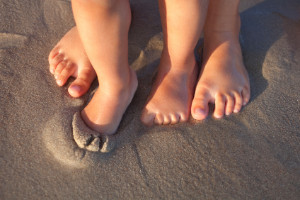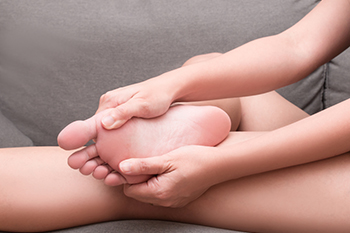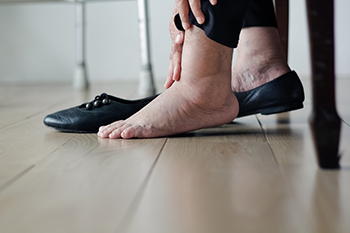Connect With Us
Blog
Items filtered by date: November 2023
Understanding the Differences Between Adult and Children's Feet

The journey from childhood to adulthood is marked by numerous transformations, and the evolution of your feet is no exception. Children's feet, characterized by their pliability and cartilage dominance, are more susceptible to external influences. Their arches may appear flat, and the bones are still developing. As children age, these structures solidify, forming the more defined arches and shapes typical of adult feet. Moreover, the fat pads on children's feet provide natural cushioning, while adults may experience thinning of these pads over time. The growth patterns and proportions differ significantly, with children's feet being relatively wider in comparison to their length. Recognizing these distinctions is vital for selecting appropriate footwear and addressing potential concerns in either developmental stage. If you would like additional knowledge about how adult and children’s feet vary, it is suggested that you confer with a podiatrist.
The health of a child’s feet is vital to their overall well-being. If you have any questions regarding foot health, contact Dr. Rouder of S.I. Podiatry. Our doctor can provide the care you need to keep you pain-free and on your feet.
Tips for Keeping Children's Feet Healthy
- Make sure their shoes fit properly
- Look for any signs of in-toeing or out-toeing
- Check to see if they have Clubfoot (condition that affects your child’s foot and ankle, twisting the heel and toes inward) which is one of the most common nonmajor birth defects.
- Lightly cover your baby’s feet (Tight covers may keep your baby from moving their feet freely, and could prevent normal development)
- Allow your toddler to go shoeless (Shoes can be restricting for a young child’s foot)
- Cut toenails straight across to avoid ingrown toenails
- Keep your child’s foot clean and dry
- Cover cuts and scrapes. Wash any scratches with soap and water and cover them with a bandage until they’ve healed.
If you have any questions, please feel free to contact our office located in Staten Island, NY . We offer the newest diagnostic and treatment technologies for all your foot care needs.
Does Pregnancy Lead to Changes in Foot Size?

Pregnancy is a transformative journey that brings about numerous changes in a woman's body. While most expectant mothers are well aware of the more obvious alterations, such as weight gain and a growing belly, the potential impact on foot size is a less commonly discussed topic. Many women wonder if their feet will permanently change in size during pregnancy. The answer, in most cases, is possibly. During pregnancy, hormonal changes, particularly the release of relaxin, can affect the ligaments in the body, including those in the feet. This increased flexibility may lead to a temporary, and sometimes permanent, increase in foot size. Additionally, as pregnancy progresses, fluid retention and swelling, known as edema, can cause the feet to become temporarily larger. While swelling typically subsides after childbirth, some women may find that their feet remain slightly larger than they were before pregnancy. Overall, it is important for expectant mothers to be prepared for these potential changes, and consider investing in comfortable, supportive footwear during and after pregnancy to ensure proper foot health and comfort. If you would like more information about how pregnancy can affect the feet, it is suggested that you confer with a podiatrist.
Pregnant women with swollen feet can be treated with a variety of different methods that are readily available. For more information about other cures for swollen feet during pregnancy, consult with Dr. Rouder from S.I. Podiatry. Our doctor will attend to all of your foot and ankle needs.
What Foot Problems Can Arise During Pregnancy?
One problem that can occur is overpronation, which occurs when the arch of the foot flattens and tends to roll inward. This can cause pain and discomfort in your heels while you’re walking or even just standing up, trying to support your baby.
Another problem is edema, or swelling in the extremities. This often affects the feet during pregnancy but tends to occur in the later stages.
How Can I Keep My Feet Healthy During Pregnancy?
- Wearing orthotics can provide extra support for the feet and help distribute weight evenly
- Minimize the amount of time spent walking barefoot
- Wear shoes with good arch support
- Wear shoes that allow for good circulation to the feet
- Elevate feet if you experience swelling
- Massage your feet
- Get regular, light exercise, such as walking, to promote blood circulation to the feet
If you have any questions please feel free to contact our office located in Staten Island, NY . We offer the newest diagnostic and treatment technologies for all your foot and ankle needs.
Treatment of Sesamoiditis

There are two sesamoid bones located beneath the big toe which aid its movement. Problems with these sesamoid bones can vary from acute injuries such as turf toe, where the toe excessively bends due to fractures. Pain may also arise from sesamoiditis, an inflammation of the sesamoids, or from arthritis affecting the toe. Symptoms of acute sesamoid issues can manifest as intense pain and difficulty in walking, while chronic conditions may cause persistent pain under the big toe, which can be aggravated by certain shoes or activities, hinting at sesamoiditis. Diagnosis typically involves examining the patient's medical history and symptoms, supported by X-rays or more detailed scans such as an MRI or CT scan. Treatment strategies for sesamoid problems range from wearing supportive footwear and activity modifications. If these measures fail, surgery might be considered, which could include removing the sesamoid bones or repairing them. If you have foot pain of any sort, it is strongly suggested that you make an appointment with a podiatrist who can accurately diagnose the problem and offer treatment options that can help you return to normal activity levels.
Sesamoiditis is an unpleasant foot condition characterized by pain in the balls of the feet. If you think you’re struggling with sesamoiditis, contact Dr. Rouder of S.I. Podiatry. Our doctor will treat your condition thoroughly and effectively.
Sesamoiditis
Sesamoiditis is a condition of the foot that affects the ball of the foot. It is more common in younger people than it is in older people. It can also occur with people who have begun a new exercise program, since their bodies are adjusting to the new physical regimen. Pain may also be caused by the inflammation of tendons surrounding the bones. It is important to seek treatment in its early stages because if you ignore the pain, this condition can lead to more serious problems such as severe irritation and bone fractures.
Causes of Sesamoiditis
- Sudden increase in activity
- Increase in physically strenuous movement without a proper warm up or build up
- Foot structure: those who have smaller, bonier feet or those with a high arch may be more susceptible
Treatment for sesamoiditis is non-invasive and simple. Doctors may recommend a strict rest period where the patient forgoes most physical activity. This will help give the patient time to heal their feet through limited activity. For serious cases, it is best to speak with your doctor to determine a treatment option that will help your specific needs.
If you have any questions please feel free to contact our office located in Staten Island, NY . We offer the newest diagnostic and treatment technologies for all your foot and ankle needs.
Underlying Medical Conditions and Foot Edema

Swollen feet can arise due to various health concerns, including skin infections and underlying health conditions. For instance, cellulitis is a painful bacterial infection causing swelling, redness, and warmth in the affected region. Particularly vulnerable are individuals with diabetes. They often face complications due to reduced healing ability and decreased sensation, which can lead to unnoticed injuries becoming infected and subsequently causing foot swelling. Another condition, lymphedema, results from impaired lymph flow, often due to damaged or removed lymph nodes. It can be congenital or caused by factors such as cancer treatments or infections. Heart failure, a severe medical condition, results in fluid accumulation, with swollen feet as a common symptom. Prolonged immobility can cause deep vein thrombosis, a potentially life-threatening blood clot. Kidney issues can also lead to swollen feet if fluid balance is disturbed. Additionally, liver disease, especially cirrhosis, can cause fluid accumulation in the lower extremities due to portal hypertension. If you have swollen feet that do not respond to rest, it is suggested that you make an appointment with a podiatrist to identify the root cause of the swelling and get treatment appropriate to what is discovered.
Swollen feet can be a sign of an underlying condition. If you have any concerns, contact Dr. Rouder of S.I. Podiatry. Our doctor can provide the care you need to keep you pain-free and on your feet.
Swollen feet are a common ailment among pregnant women and people who stand or sit for extended periods. Aging may increase the possibility of swollen feet and patients who are obese often notice when their feet are swelling too. There may be medical reasons why swollen feet occur:
- Phlebitis - A condition that causes the veins to become inflamed and can also cause leg pain.
- Liver disease - This may lead to low blood levels of albumin which is a protein. This can cause fluid in the blood to pass into the tissues and several areas of the body can become swollen.
- Heart failure - When the heart doesn’t pump properly the blood that is normally pumped back to the heart can pool in the veins of the legs causing swollen feet.
- Kidney disease - One of the main functions of the kidneys is releasing excess fluid in the body. This type of condition can make it difficult for the kidneys to function properly, and as a result the feet may become swollen.
- Deep-vein thrombosis (DVT)- This is a serious condition where blood clots form in the veins of the legs. They can block the return of blood from the legs to the heart which may cause the feet to swell. It is important to be treated by a podiatrist if this condition is present.
Swollen feet can also be caused by bone and tendon conditions, including fractures, arthritis, and tendinitis. Additionally, there may be skin and toenail conditions and an infection may cause the feet to swell. Patients who take medicine to treat high blood pressure may be prone to getting swollen feet.
Many patients elevate their feet to help relieve the swelling and this is generally a temporary remedy. When a podiatrist is consulted the reason behind the swelling can be uncovered and subsequently treated.
If you have any questions please feel free to contact our office located in Staten Island, NY . We offer the newest diagnostic tools and technology to treat your foot and ankle needs.

